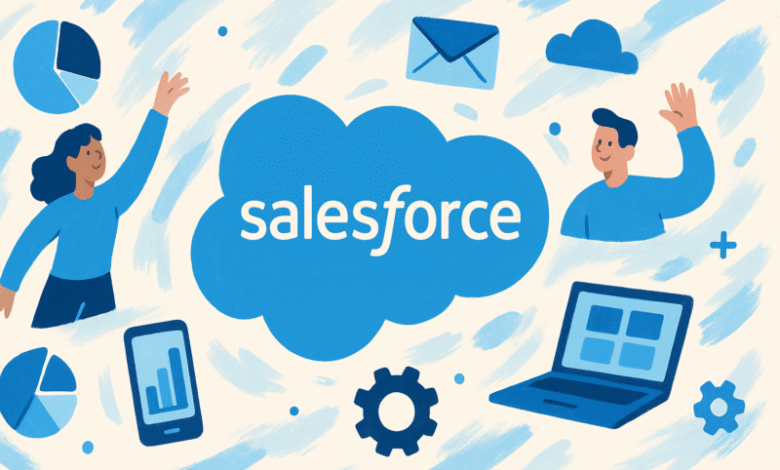Salesforce embeds AI agents in Slack for marketing teams

▼ Summary
– Salesforce launched Agentforce 360, an AI-driven platform embedding virtual agents across its ecosystem, including Slack, to automate routine work and unify data, people, and AI.
– Slack becomes the primary workspace for interacting with AI agents and customer data, featuring conversational AI, core modules for sales and service, and connectors to tools like Gmail and Outlook.
– Agentforce 360 introduces new controls for reliability, such as Agent Script for defining agent behavior, reasoning models for contextual logic, and a no-code builder for designing agents.
– Marketers face adoption risks including unclear ROI, high costs from overlapping licenses, and the necessity of accurate, structured data for success, with Context Indexing to organize unstructured data.
– The platform aims to create an AI-first, conversational workplace but could become a high-cost experiment without a solid data foundation, transparent pricing, and measurable ROI.
Salesforce has officially introduced Agentforce 360, a new AI-driven platform that integrates virtual agents directly into its ecosystem, with a major emphasis on Slack. Announced just before Dreamforce, this rollout is designed to automate repetitive tasks and bring together data, team members, and artificial intelligence within what Salesforce calls its “trusted platform.” For marketing professionals, this launch represents a pivotal shift in how artificial intelligence interacts with everyday operations, while also raising critical questions about implementation costs, data governance, and return on investment.
Slack is now positioned as the central workspace for interacting with AI agents and accessing customer information. Rather than functioning only as a messaging tool, Slack becomes the primary interface for the Salesforce ecosystem. Key enhancements include conversational AI that lets users ask questions about customer data or complete Salesforce tasks through simple chat, all backed by enterprise-level privacy controls. Core Agentforce applications for sales, service, IT, and human resources are being released this month, with wider availability anticipated by early 2026. Slack will also expand its enterprise search capabilities by integrating with Gmail, Outlook, and Dropbox, establishing it as a unified hub for search and workflow management. Additionally, Agentforce Voice will offer live-transcribed, highly realistic voice interactions, allowing human agents to seamlessly take over conversations when needed, a vital feature for maintaining customer experience continuity.
To address common concerns about AI reliability and unpredictable outputs, Agentforce 360 incorporates several new control features. An Agent Script tool, available in beta this November, provides a human-readable JSON format that lets users set specific logic and behavioral boundaries for AI agents. Reasoning models from providers like Anthropic, OpenAI, and Google Gemini enable agents to process contextual information more deeply, essentially “thinking before responding” rather than relying on superficial patterns. The platform also includes Agentforce Builder, a no-code environment where teams can design, test, and refine agents using natural language before deployment. Salesforce highlights that these capabilities are built on insights from over 12,000 existing implementations, aiming to help customers move beyond the “pilot purgatory” stage where AI projects often stall before delivering tangible value.
Even with these advancements, marketers face familiar obstacles. Adoption risk remains a significant barrier, with industry analysts predicting that nearly 40% of agentic AI projects could be abandoned by 2027 due to unclear returns and rising expenses. Pricing is another area of complexity, as licensing fees for Salesforce core clouds, Slack, Data Cloud, and Agentforce itself may overlap, creating a “stack effect” that drives up total costs compared to developing in-house AI solutions. Data readiness is absolutely essential for success, since the performance of AI agents depends entirely on the quality and structure of the underlying customer data. To support this, Salesforce is launching Context Indexing, powered by Data 360, which organizes and makes sense of unstructured data so it can be used effectively by Agentforce. This feature is scheduled for general availability later in the month.
In summary, Agentforce 360 represents a major step in Salesforce’s push toward an AI-first, conversation-driven workplace where Slack serves as both the user interface and the engine for data operations. For marketing leaders, the potential benefits include quicker insights, more proactive customer service, and scalable personalization. However, these advantages come with clear risks. Without a solid data foundation, transparent pricing models, and measurable return on investment, Agentforce 360 could end up as another costly experiment rather than a true catalyst for marketing transformation. The coming months will determine whether Salesforce’s AI agents can fulfill the long-standing promise of trusted, automated customer engagement at scale.
(Source: MarTech)





